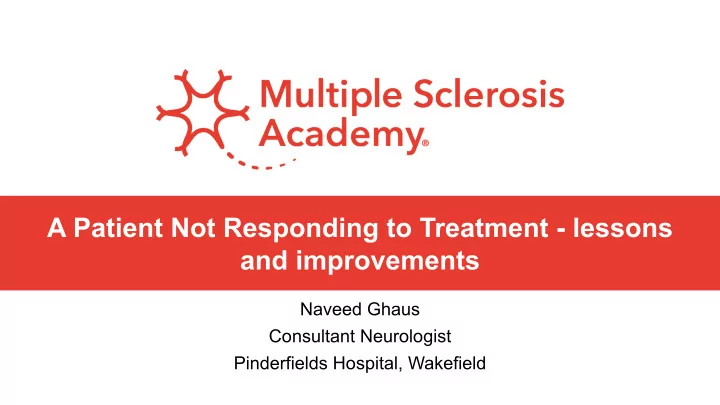

A Patient Not Responding to Treatment - lessons and improvements Naveed Ghaus Consultant Neurologist Pinderfields Hospital, Wakefield
A Patient Not Responding to Treatment • Aims : • Review management of a deceased patient with advanced MS in detail • Identify areas of improvement in the management of such difficult to manage patients • Share the findings within local and regional CPD meetings • Implement changes to improve MS care
A Patient Not Responding to Treatment • ML, male, b1985 • Age 19y – 2005 slurred speech, right hemiparesis and hemi-sensory loss, hemianopia. – Ataxia & vertigo 2007 – 2010 stable, no relapses over 2-3 y – (Cognitive decline since 2007) – Aug 2013 ataxia, R hemiparesis, – Jul 2014 leg weakness, summer 2015 leg weakness • Nov 2016: EDSS 5.0 (p3, c2,bs0,s2, b/b2, c2, v2) – copaxone
A Patient Not Responding to Treatment • Jan 2017 JC virus +ve 3.37 • Mar 2017 dysphagia, dysarthria, paraplegia (R>L) • Admission-Mar 2017- Jun 2017 • Lemtrada (alumtuzumab) Apr 2017 • May 2017 dysphagia, right leg weakness • Aug 2017- mobilised with elbow crutches, word finding difficulties, memory impairment • October 2017 – admitted with general deterioration. Worsening mobility around home, significant deterioration in speech, slurring and incontinent of urine. – MRI 10/11/17 – areas of increased signal in brain and spinal cord. – 14/11/17 – CSF virology incl JCV- not detected • EEG – slow activity left hemisphere, no epileptiform activity
A Patient Not Responding to Treatment • Worsening spasticity in upper limbs, • Nov 2017 – Repeat LP: JCV PCR +ve- WBC 10, RBC 4, Protein 0.5, glucose 5.1, ser glucose 6.4 • Dec 2017 – plasmapheresis ,3 sessions. Attempted 4 th -- blood clotting in the machine • ‘Frontal lesions suspicious, may need biopsy, very active disease, not typical of PML, but could be. If PML excluded may benefit from next dose of Alemtuzumab being brought forward. Otherwise needs cyclophosphamide’.
A Patient Not Responding to Treatment • Jan 2018 CSF – No JCV. No virology detected • Discussion with virology consultant– happy to call negative test for JCV given as 2 subsequent samples negative • Jan 2018 – Brain CNS MDT for ?biopsy – Outcome: not convinced that a biopsy is likely to change management significantly. • Family felt that treating for MS would be best option rather than biopsy
A Patient Not Responding to Treatment
A Patient Not Responding to Treatment
A Patient Not Responding to Treatment
A Patient Not Responding to Treatment
A Patient Not Responding to Treatment
A Patient Not Responding to Treatment • Jan/Feb 2018: Alumtuzumab • Smiling, moving limbs on request, increased tone, needing hoist, eating & drinking well • Discharge planning issues • Recurrent UTIs • Urinary catheter problems, suprapubic inserted • Mar 2018: discharged to Nursing Home & re-admitted for ?seizure
A Patient Not Responding to Treatment • Apr 2018: Botox for arm dystonia, later for urinary bladder • Safeguarding & DOLS • May 2018: PEG referral • Recurrent infections • Progressive worsening, quadreparesis, no speech, rare smile to family • Jul 2018: symptomatic treatment • Palliative care team & discharge to Nursing Home
A Patient Not Responding to Treatment • 23 Jul 2018: Discharged • 29 July 2018: RIP
• Outcome of the project: • The details were discussed within the local MS Nurse Specialist Team and CPD Meetings • It was identified that there was difficulty with compliance on patient’s behalf and also Trust’s own efforts to keep the patient fully engaged with the management process were not successful
• Outcomes of the project (cont’d): • The clinical management towards the end was partly by the General Neurology colleagues because of retirement of the Specialist Consultant. • It was identified by the Trust management that MS care is highly specialised and needs involvement of a Specialist rather than a General Neurologist.
A Patient Not Responding to Treatment • Changes after the project: • The Trust has successfully made a new appointment of a Consultant with special interest in MS. • The details were presented at the regional Neurology CPD meeting for awareness, prevention and management of any similar issues. • The regional CPD meeting recommended to report cases of worsening after alumtuzumab treatment as there have been an anecdotal incidences of such cases.
• Changes after the project: (cont’d) • Additional checks have beenplanned for the future especially for ‘DNA’ in clinics
Thanks
Recommend
More recommend